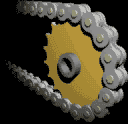
Back ዘዋሪ ሰንሰለት Amharic Cadena de rodets Catalan Rollenkette German Cadena de rodillos Spanish Chaîne à rouleaux French Catena articolata Galle Italian Rullīšu ķēde Latvian/Lettish Kjede NN Kjede NB Łańcuch rolkowy Polish


Roller chain or bush roller chain is the type of chain drive most commonly used for transmission of mechanical power on many kinds of domestic, industrial and agricultural machinery, including conveyors, wire- and tube-drawing machines, printing presses, cars, motorcycles, and bicycles. It consists of a series of short cylindrical rollers held together by side links. It is driven by a toothed wheel called a sprocket. It is a simple, reliable, and efficient[1] means of power transmission.
Sketches by Leonardo da Vinci in the 16th century show a chain with a roller bearing.[2] In 1800, James Fussell patented a roller chain on development of his balance lock[3] and in 1880 Hans Renold patented a bush roller chain.[4]
- ^ As much as 98% efficient under ideal conditions, according to Kidd, Matt D.; N. E. Loch; R. L. Reuben (1998). "Bicycle Chain Efficiency". The Engineering of Sport conference. Heriot-Watt University. Archived from the original on 6 February 2006. Retrieved 16 May 2006.
- ^ In the 16th century, Leonardo da Vinci made sketches of what appears to be the first steel chain. These chains were probably designed to transmit pulling, not wrapping, power because they consist only of plates and pins and have metal fittings. However, da Vinci's sketch does show a roller bearing.Tsubakimoto Chain Co., ed. (1997). The Complete Guide to Chain. Kogyo Chosaki Publishing Co., Ltd. p. 240. ISBN 0-9658932-0-0. p. 211. Retrieved 17 May 2006.
- ^ "The Repertory of Patent Inventions, and Other Discoveries and Improvements in Arts, Manufactures, and Agriculture: Being a Continuation, on an Enlarged Plan, of the Repertory of Arts and Manufactures ..." G. and T. Wilkie. 1800. p. 303. Retrieved 7 January 2021.
- ^ Reid, Carlton (2015). Roads were not built for cars : How cyclists were the first to push for good roads & became the pioneers of motoring. Washington, DC: Island Press. p. 196. ISBN 9781610916899.